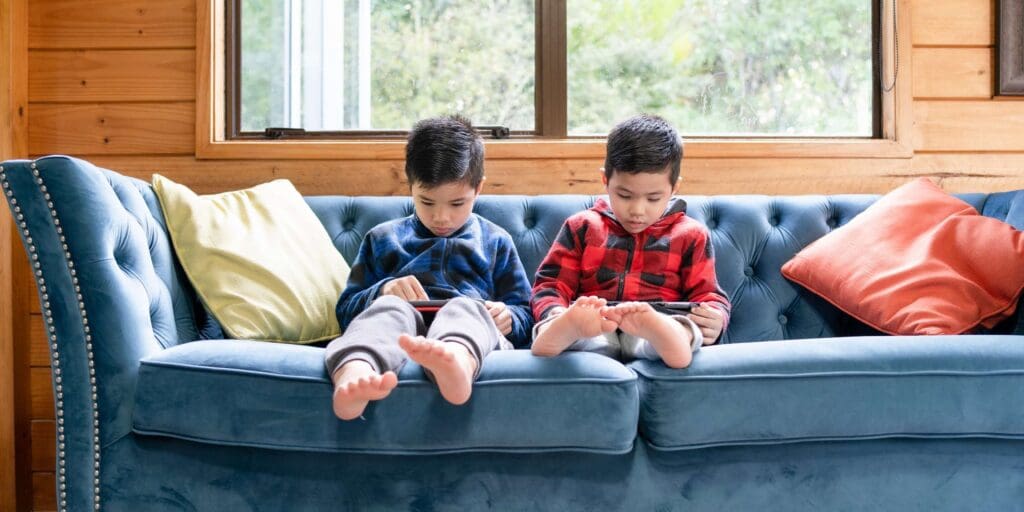3 Powerful Things That Help Limit Screentime For Kids
As a mom of 3, screen time is my lifesaver, but I’ve also seen the negative effects of screen time. So how much screen time is too much for a kid? If you’re like me and want to limit some of the screen time your kids get, here are my best tips for you!
Even though sometimes the idea of unlimited time with devices and electronics is super tempting because it keeps the kids quiet and sometimes parents need a minute of peace, I still only allow 45 minutes per day.
But with that minute of peace, comes a huge wave of mom guilt. According to this study completed in 2016, Screen time is the NUMBER 1 reason parents feel guilty!
According to american academy of pediatrics young children who spent too much time in front of a screen can have sleep problems and have lower grades in school.
I don’t know about you, but I’m in the same boat, I have huge guilt if my children spend over an hour on their electronic devices.
However, setting limits on how much TV / Video Game time your child has isn’t always easy in today’s technology-forward world which is why we are facing excessive screen time battles.
The most important thing is creating a healthy screen time balance with physical activity and common sense media for our overall mental health.
This post may contain affiliate links. Full privacy policy and disclosure here.
See also: 16 Fresh Educational Shows On Netflix For Kids
How Much Should You Limit Kids Screen Time
Screens are addicting. How many adults do you see that can’t even put their phones down when they drive? How many hours a day do you scroll screen media mindlessly?
Me? Too many… way too many. I’m addicted to screen media myself.
Can we really blame our young kids for getting so addicted to their devices? I can’t blame mine. I can blame myself but what good does that do?
We can help our children (and ourselves) by breaking some bad habits and putting in place some systems to decrease the hours of screen time.
It is very simple to turn off any device after too much screen usage, tear it out of your children’s hands and go on with your day.
However, those kinds of actions generally cause some sort of meltdown.
When I was looking for strategies to cope with the disconnection of screens, I was hoping to use positive parenting strategies, as that is the way I parent my children.
I wanted to bring my children back into the real world without the hardships that came along with it.
See also: 7 Amazing Benefits Of Hugging Your Children

How You Can Limit Daily Screen Time
There are 3 things you can do to set time limits in your home. Remember that there is no right or wrong amount of screen time…I mean there are many experts who would argue, but I am a Mom with a busy household just like you, and I’m telling you, do what works for you.
So here is what I do, and what you can do too.
- Set A Schedule
- Allow Binge Days
- Track Screen Time
But before you set your schedule and allow for binge days, talk to your child about the dangers of too much screen time and your expectations for sitting in front of screens.
Talk to your children about balance, if they are old enough to understand.
Tell them the importance of limiting time on the screen such as strain on the eyes (we use these blue light glasses to help), the importance of movement and exercise as well as face interactions, and the effect too much time on digital media.
If you can talk to your child about balance, you can use phrases in real life such as “Looks like it’s time to get off the Switch, we need to create balance”.
But because children need more than a chat about balance to reduce the amount of time they spend on their digital devices, here are 3 more things you can do to help limit the screen time in your home.
See also: 5 Ways To Support Your Child Through Their Post Holiday Meltdowns
Dive into our comprehensive guide on crafting a balanced digital life for your kids, where screen time meets green time. Click to learn the secrets of integrating tech with touch – it’s time to redefine family time!
Set A Schedule
It’s no secret that younger children thrive on routine, and setting a schedule for screen time can help set some rules and expectations around the home.
In our home, screen time is allowed while I’m making dinner. This works well for me because otherwise, the kids distract me and I end up burning dinner.
If I can have a full hour without the kids asking for my attention, the whole evening goes more smoothly.
For you, screen time could be 15 minutes while you shower, and 45 minutes after lunch.
For others, maybe an hr of screen time after school is the best. It all depends on your family, but the important thing is to set a schedule and stick to it. Create a routine, make it predictable.
Consistency is key when it comes to creating a routine. As kids grow up, they will try to negotiate, but you must stick to your guns and stick to the schedule you created.
See also: 16 Important Books For Kids About Sibling Rivalry
Allow Binge Days
If you’re a busy family with after school activities or simply don’t have time for screen time during the weekdays (or have limited amounts), perhaps a binge day on the weekend is what you need, unless your kids are still in their younger ages.
Be careful if you see signs of screen addiction if you use this idea.
You can provide no limitations on the weekend and set a day of high-quality programming, or you can give permission to have screen time on Saturday mornings only until 10am, or only allow the use of educational apps depending on the child’s age.
Whatever works for your family. If you have birthday parties and playdates on Saturday afternoons, then you have the perfect opportunity to end screen time as soon as it is time to get ready.
After you get home, there should be no expectations of screen time since there was too much use of kids’ screen time in the morning.
See also: Easy 1 Year Old Daily Schedule From A Mom Of 3
Be sure to brainstorm a list of things to do when they’re bored, so their go-to is not just to turn on a screen.
Even if it’s just among siblings, social interaction is very important for kids mental health and it helps aid in behavioral problems too.
In the winter time my kids get a screen day Saturday, which literally means screens all day – free for all.
Now this is because it’s freezing cold outside and I simply do not want to go out in that weather, nor do I want to spend time at play places which are crawling with cold and flu germs during this season.
We balance it out with no screen time on Friday after school and on Sunday as well. So for our family, this works!
We also have daily family meals and enjoy board games on the weekends for that extra quality time and face to face interaction.
Track Screen Time
There are many apps available to help you and your family track screen time.
It’s a good idea to track the amount of time you spend on the screen and if that time is excessive, you can make a plan on how to limit that with parental controls.
This is a good tactic if you have older children who have their own tablet. if you notice Lucy spent 90 minutes on Instagram one Tuesday afternoon, you can have a talk about balance and provide a 15-minute limit to Instagram time on Tuesday evenings.
Make sure to use the tracking apps to start conversations about screen time use and balance in your family. You can also involve your kids in screen time limit decisions.
For example, if Lucy believes she should get 20 minutes of screen time on Tuesday and is willing to give up Instagram on Wednesdays, then maybe that works better for your family.

How I Avoid The Screen Time Tantrums
Have you ever been in the middle of a movie and all of a sudden the power cut out?
You probably got pretty frustrated and tried to find a solution so you can get back to your show.
How about if you’re trying to send a text and your phone suddenly shows a pop up that won’t go away. Pretty darn frustrating.
For adults, simple things like that can trigger a tantrum. Yes, I do believe adults have tantrums!
Imagine you are a small child, one who doesn’t really know how to regulate their emotions.
Someone who is still relatively new to the world, be it 5 years or 10 years, they are still new and still learning.
Put yourself in a situation where you are 5 years old and you’re playing a game.
You love this game so much and it’s really interesting.
You may have heard a five-minute warning, but it went in one ear and out the other. You’re far too interested in this game.
Then all of a sudden, your game gets shut off.
Power out, just like that. (kind of like the blackout during a movie)
Do you:
A) Lose your mind
B) Calmly move onto the next situation
Most likely A.
This is when the tantrums, the talking back, the frustration that grows on both ends of the situation.
Avoid that, with one simple rule.
Engage With The Situation.
What I mean by that:
Create a moment of connection between you and your child in their moment of screen time and show interest in their activity.
What you’re doing is creating a positive connection with your child and slowly pulling them out of their zoned-out coma, gently.
I’ll put these helpful tools into action for you so you can really understand what I’m trying to say.
If your child is watching a television show, sit down next to them. Be there with them for just a few moments and then engage in conversation.
A simple question such as “What are you watching?” or “Who is that character, I’ve never seen him before?” can trigger a response.
Once your child responds to you, they are slowly being pulled out of the zoned-out state of mind.
Your child should now be aware of your presence and will be more inclined to remember what you say to them.
This is now a great time to bring up the next task at hand for example “Bath time is in 5 minutes” or “it is time to turn off your tablet now.
The bottom line is you’ll be surprised how often your child may even turn their device off before the given time frame is up.
What you did was engage with your child, come down to their world and slowly pull them back into reality.
Try It Yourself
Try Engaging With The Situation yourself!
- Next time your child is in a zoned-out state of screen time zombies, sit down next to them for 30 seconds to a minute or so and just be there with them.
- Ask a question about the activity and show some interest.
- Pull your child out of their zoned out state with conversation and present the upcoming series of events.
Remember that regulating emotions is something humans work on their whole lives, it is not an easy thing to just grasp in childhood.
Screen time Effect On Your child’s development
A child’s exposure to digital devices can have negative effects on their development. Research has shown that screen time affects a number of aspects of a child’s development, including their attention span and ability to learn new things.
As well, the light from screens can disrupt a child’s circadian rhythm, which can result in sleep problems.
Children should be limited to an hour or less of screen time per day for infants and toddlers, and no more than two hours for older children.
If you must use a device for work or other reasons, give your child a break every 20 minutes. Switch off the device if you notice that your child is zoning out or not paying attention to what you are saying.
And don’t expect your child to sit still on the device so they can get better at sitting still at home.

Remember That Screen Time Isn’t All Bad
Kids’ screen time can be educational and/or fun, it doesn’t have to be all bad. Sure if children are spending 10 hours a day playing Minecraft, they could become zombified lazy kids, but they can also use screen time to learn new and exciting things!
For example, YouTube is a great place for children to learn about Space, how the body works, how different animals live and more. There are many valuable things that children can get out of screen time.
My 5-year-old loves his Leap pad where he learns all about ABCs and early reading. I will never deprive him of this learning time, even if it is on a screen.
See also: 6 Things You Can Do To Teach Your Child Self-Regulation Skills
While there are so many things your kids could be doing that are time-wasters that have no impact on child development such as watching TikTok dances (and not practicing them) or playing mindless video games (even though Minecraft does teach them some interesting real-life things) it doesn’t mean that all screen time is bad bad bad.
Some children’s screen time can be healthy such as looking at interactive picture books as long you follow the recommended guidelines to reduce excess screen time with today’s children.

Get Your Free Download
Take your parenting journey to the next level with our comprehensive ebook on Connected Parenting.
Download this ebook now and embark on a transformative parenting experience that will strengthen your bond with your child and bring joy and fulfillment to your family life.
Download Here
Additional Reading
- Reid Chassiakos Y, Radesky J, Christakis D, et al. Children and adolescents and digital media. Pediatrics. 2016;138(5):e20162593. doi:10.1542/peds.2016-2593
- Council on Communications and Media, Hill D, Ameenuddin N, et al. Media and young minds. Pediatrics. 2016;138(5):e20162591. doi:10.1542/peds.2016-2591
- Council on Communications and Media. Media use in school-aged children and adolescents. Pediatrics. 2016;138(5):e20162592. doi:10.1542/peds.2016-2592
Citations
- McArthur BA, Browne D, McDonald S, Tough S, Madigan S. Longitudinal associations between screen use and reading in preschool-aged children. Pediatrics. 2021;147(6). doi:10.1542/peds.2020-011429
- Walsh JJ, Barnes JD, Cameron JD, et al. Associations between 24 hour movement behaviours and global cognition in US children: a cross-sectional observational study. The Lancet Child & Adolescent Health. 2018;2(11):783-791. doi:10.1016/S2352-4642(18)30278-5.
- Healthychildren.org. Where We Stand: Screen Time.
- van den Heuvel M, Ma J, Borkhoff CM, et al. Mobile media device use is associated with expressive language delay in 18-month-old children. J Dev Behav Pediatr. 2019;40(2):99-104. doi:10.1097/DBP.0000000000000630
- Madigan S, Browne D, Racine N, Mori C, Tough S. Association between screen time and children’s performance on a developmental screening test. JAMA Pediatr. 2019;173(3):244. doi:10.1001/jamapediatrics.2018.5056
- Madigan S, Racine N, Tough S. Prevalence of preschoolers meeting vs exceeding screen time guidelines. JAMA Pediatr. 2020;174(1):93. doi:10.1001/jamapediatrics.2019.4495
- Brandt A, Gebrian M, Slevc LR. Music and early language acquisition. Front Psychol. 2012;3:327. doi:10.3389/fpsyg.2012.00327
- Madigan S, Eirich R, Pador P, McArthur BA, Neville RD. Assessment of changes in child and adolescent screen time during the COVID-19 pandemic: A systematic review and meta-analysis. JAMA Pediatrics. 2022;176(12):1188. doi:10.1001/jamapediatrics.2022.4116
- American Academy of Pediatrics. Beyond screen time: Help your kids build healthy media use habits.
- Lee SI, Matsumori K, Nishimura K, et al. Melatonin suppression and sleepiness in children exposed to blue-enriched white LED lighting at night. Physiol Rep. 2018;6(24):e13942. doi:10.14814/phy2.13942
- Children’s Hospital Colorado. The benefits of physical activity and exercise on mental health.
- Paulich KN, Ross JM, Lessem JM, Hewitt JK. Screen time and early adolescent mental health, academic, and social outcomes in 9- and 10- year old children: utilizing the Adolescent Brain Cognitive Development (ABCD) study. PLoS One. 2021 Sep 8;16(9):e0256591. doi:10.1371/journal.pone.0256591
- American Academy of Child & Adolescent Psychiatry. Screen time and children.
- American Academy of Pediatrics Council on Communications and Media. Media and young minds. Pediatrics. 2016 Nov;138(5):e20162591. doi:10.1542/peds.2016-2591
- Barnett TA, Kelly AS, Young DR, et al. Sedentary behaviors in today’s youth—approaches to the prevention and management of childhood obesity: A scientific statement from the American Heart Association. Circulation. 2018;138(11). doi:10.1161/CIR.0000000000000591
- U.S. National Library of Medicine. Health risks of an inactive lifestyle.
- American Academy of Pediatrics. Children and media tips from the American Academy of Pediatrics.
- Chang AM, Aeschbach D, Duffy JF, Czeisler CA. Evening use of light-emitting eReaders negatively affects sleep, circadian timing, and next-morning alertness. Proc Natl Acad Sci USA. 2015;112(4):1232-1237. doi:10.1073/pnas.1418490112
- Wahl S, Engelhardt M, Schaupp P, Lappe C, Ivanov IV. The inner clock—Blue light sets the human rhythm. J Biophotonics. 2019;12(12). doi:10.1002/jbio.201900102
- Parkes A, Green M, Pearce A. Do bedroom screens and the mealtime environment shape different trajectories of child overweight and obesity? Research using the Growing Up in Scotland study. Int J Obes. 2020;44(4):790-802. doi:10.1038/s41366-019-0502-1
- Guan H, Okely AD, Aguilar-Farias N, et al. Promoting healthy movement behaviours among children during the COVID-19 pandemic. Lancet Child Adolesc Health. 2020;4(6):416-418. doi:10.1016/S2352-4642(20)30131-0
- Wu CST, Fowler C, Lam WYY, Wong HT, Wong CHM, Yuen Loke A. Parenting approaches and digital technology use of preschool age children in a Chinese community. Ital J Pediatr. 2014;40(1):44. doi:10.1186/1824-7288-40-44
- Peracchia S, Curcio G. Exposure to video games: Effects on sleep and on post-sleep cognitive abilities. A systematic review of experimental evidences. Sleep Sci. 2018;11(4):302-314. doi:10.5935/1984-0063.20180046






